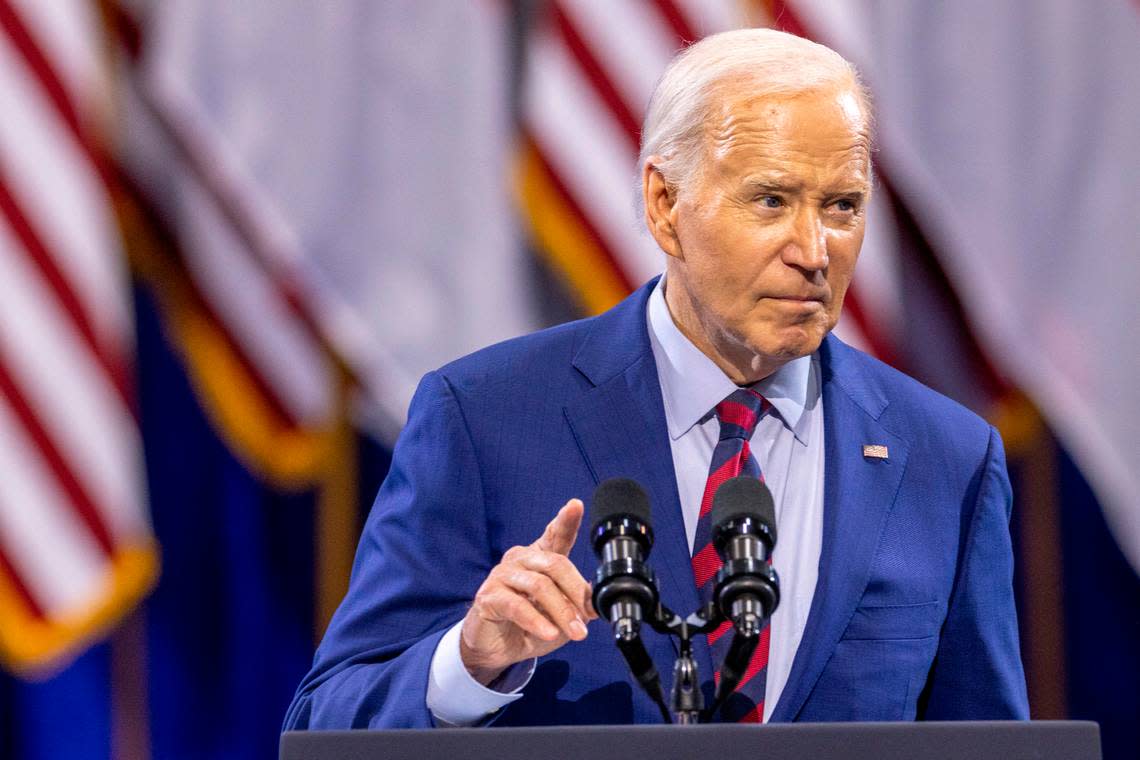President Biden, in Wilmington, NC, touts efforts to replace lead pipes in water systems
During a Thursday visit to Wilmington, President Joe Biden touted $3 billion in newly released federal funding to help water utilities nationwide find and replace lead service lines.
The Bipartisan Infrastructure Law included $15 billion to identify and replace lead service lines. The Environmental Protection Agency has distributed those funds in $3 billion segments, with Thursday’s announcement representing the third of those.
North Carolina’s portion of the new distribution is $76.2 million, which will be disbursed by the N.C. Department of Environmental Quality. That brings the total amount of lead service line funds North Carolina has received to $250.55 million.
“I’m determined to fix it and we’re finally moving. Until the United States of America, God love us, deals with this, how can we say we’re a leading nation in the world? For God’s sake, we’re better than this,” Biden said.

And while Thursday technically was an announcement of actions taken by the administration, it came against the backdrop of a close presidential race again pitting Biden against the presumptive GOP nominee, former President Donald Trump. Trump was forced to cancel a rally in Wilmington two weeks ago because of severe weather.
There is no safe level of lead in drinking water. Lead is a neurotoxin that can cause babies to be born early or too small; hinder learning in children and stunt their growth; and increase blood pressure and cause kidney problems in adults, according to the EPA.
“We know we can stop it. We know how to do it ” Biden said.
To do that, Biden has set a goal of replacing all of the estimated 9 million lead service lines nationwide by the early 2030s. The EPA estimates that North Carolina has 300,000 lead service lines.
The EPA is also expected to finalize an updated Lead and Copper Rule this year. The proposed rule lowers the level that requires utilities to take action on lead from 15 to 10 parts per billion, requires them to regularly update inventories that show where lead pipes are located, and requires public water systems to replace most lead pipes within 10 years.
“No matter whether it’s lead or forever chemicals, this president has demonstrated that he’s using every tool in the toolbox, whether it be resources from Congress or statutory authority form his agencies, to protect the drinking water for every single family in the country,” EPA Administrator Michael Regan, a North Carolina native and former secretary of the N.C. Department of Environmental Quality, told The News & Observer Thursday.

The funding does not address lead pipes that exist on private property or within the walls of homes. Many utilities, including Durham Water and Raleigh Water, add chemicals intended to keep pipes from corroding in an effort to prevent the chemical from leaching into drinking water.
Ali Zaidi, the White House’s national climate adviser, told reporters the Biden administration’s vision of infrastructure is broader than roads, bridges and high-speed rail projects.
“Those are the projects above the ground that captivate our imagination. What’s equally important and perhaps more is us meeting our moral responsibility to our young people: delivering clean air and clean water,” Zaidi said.

A campaign hot spot
The Biden campaign has long planned to target North Carolina, which Trump won by 1.3% in 2020. That’s a narrower margin than the 3.66% by which Trump won the state in the 2016 presidential election.
While Thursday marked Biden’s first visit to Wilmington this campaign season, he and cabinet secretaries have been frequent visitors to North Carolina in recent months. That includes a March 26 visit Biden and Vice President Kamala Harris made to Raleigh to tout the administration’s health care plan and an April 10 visit Regan made to Fayetteville to announce the nation’s first-ever drinking water standards for some forever chemicals.
Before flying to Wilmington Thursday, Biden visited Charlotte, where he met with families of law enforcement officers killed and wounded on Monday.

“This is the president’s third visit to North Carolina in just the past four months. So it’s clear that our state is very important to him,” N.C. Gov. Roy Cooper said, drawing some laughter from the crowd.
Trump has visited the city at least three times during the 2016 and 2020 campaign seasons, including an official presidential visit in September 2020 to designate Wilmington the nation’s first American World War II Heritage City.
President Joe Biden visits with NC families of officers killed in Charlotte shooting
Looking for lead in North Carolina
At first glance, Wilmington seems like a curious choice for an announcement about replacing lead pipes. The Cape Fear Public Utility Authority, which provides drinking water to much of Wilmington and New Hanover County, has not identified any lead service lines in its system.
The utility has grappled more publicly with the challenge of forever chemicals, most significantly but not entirely GenX compounds coming down the Cape Fear River from Chemours’ Fayetteville Works plant.
“Families today have too much going on to be worried about whether they can trust their tap water. And Wilmington, Southeastern North Carolina, knows about that. They know about the fight for clean water,” Cooper said.
The Wilmington-area utility has obtained $4.16 million of Bipartisan Infrastructure Law funding from the N.C. Department of Environmental Quality to replace 300 service lines that are suspected to have lead “gooseneck” connectors between the public water system and the service line that runs into a home.
That’s one of 96 lead service line projects selected by DEQ. Many of the projects DEQ has identified so far are the initial inventory of finding and confirming there is lead in service lines, rather than replacements.
In Wake County, Fuquay-Varina has received $500,000 to find lead pipes that need to be replaced, while Durham and Orange counties each received $1 million to verify that suspected pipes or connections do contain lead.
Both Durham Water and Raleigh Water are more than halfway done with their lead service line inventories, and neither has identified any lead service lines. They’ve each found a small number of galvanized pipes — 353 in Raleigh and 24 in Durham — may need to be replaced because lead can build up on their coating over time.
This story was produced with financial support from the Hartfield Foundation and Green South Foundation, in partnership with Journalism Funding Partners, as part of an independent journalism fellowship program. The N&O maintains full editorial control of the work. If you would like to help support local journalism, please consider signing up for a digital subscription, which you can do here.
